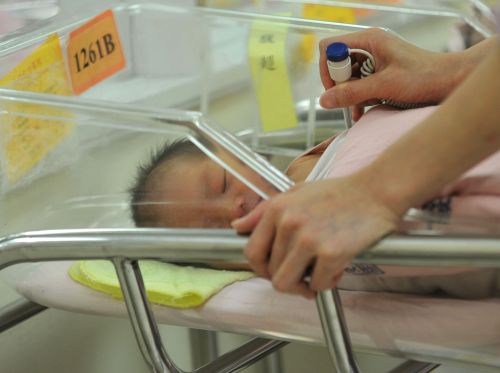Compared to the generation born before World War II, modern toddlers reportedly have a life expectancy of 20 years longer, according to a report by the Daily Mail.
 |
A nurse inspects a newborn baby at a nursery in a hospital in Taipei. (AFP-Yonhap News) |
Due to remarkable economic development and medical science, as well as healthier lifestyles and working conditions, average life expectancy is up to 78 among men from 58 in 1930s.
As for women, the average lifespan is up to 82 years from 62 in the ’30s.
According to the report in the ONS journal Social Trends, elderly people can expect to spend the remainder of their lives in good health.
One of the main reasons for the 20-year extension is the considerable decrease in infant mortality rates, which were at their lowest recorded level in 2010, it stated.
Also, 11,500 people in U.K. lived past age 100, quadruple the number from 30 years ago.
ONS interim life tables for 2009 also revealed that the middle class people has benefited far more from improved health and living standards than those in lower classes.
By Jung Eun-jung
(
kristin2j@gmail.com)
Intern reporter
Edited by Rob York
<한글 요약>
현 세대 아기 평균 20년 수명 연장돼
꾸준히 수명이 연장 되고 있는 가운데 제 2차 세계 대전 발발 이전 세대에 비해 현 세대 유아의 수명이 20년 정도 연장되었다고 영국 데일리 메일 지에서 보도했다.
현저한 경제 성장과 의학 기술, 건강해진 생활 방식과 업무 습관은 1930년대 평균 58세 이었던 남성의 수명을 현재 78세로 연장 시켰다.
여성은 1930년대 62세에서 현 세대에 82세로 수명이 연장되었다.
ONS 소셜 트렌드 저널의 자료는 현재 인간은 남은 수명 기간 동안 좋은 건강 상태로 지낼 수 있게 되었으며 20년 수명 연장은 영아 사망률이 급격히 감소했기 때문이라고 밝혔다.
실제로 11,500명의 영국인이 100세가 넘은 것으로 기록되며 이는 30년 전에 비해 4배 많은 수로 상당히 많은 사람이 장수하는 것으로 나타났다.
또한 ONS의 2009년 임시 생명표에 따르면 중산층이 다른 계층에 비해 향상된 건강 및 삶의 기준을 통해 가장 큰 혜택을 본 것으로 드러났다.







![[Today’s K-pop] Blackpink’s Jennie, Lisa invited to Coachella as solo acts](http://res.heraldm.com/phpwas/restmb_idxmake.php?idx=644&simg=/content/image/2024/11/21/20241121050099_0.jpg)
